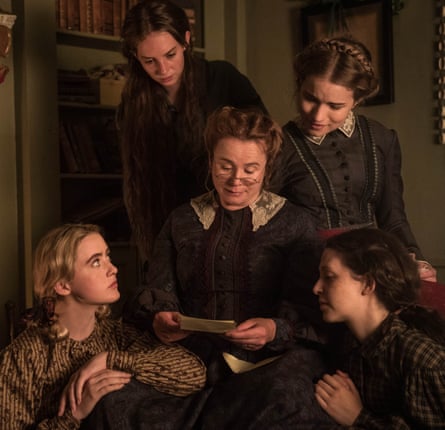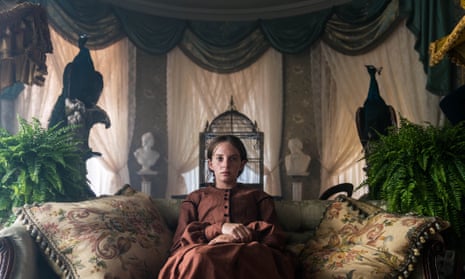I’m worried about the new TV adaptation of Little Women. I’m not worried it won’t be like the book; I’m worried it might be too faithful. Because since I first read Louisa May Alcott’s 1868 tearjerker as a child, I’ve come to find it more and more troubling. I’m excited to see what writer Heidi Thomas (who created Call the Midwife) will do. I want to see Maya Hawke’s Jo, and I really want to see Emily Watson’s Marmee. But what if they stick to the story Alcott tells of the lively March sisters being tamed and subdued and ditching their dreams to achieve what Mary Gaitskill called “one-dimensional goodness”?
It’s very hard to see Jo, the rebel, writer, tomboy, misfit and author avatar – an enterprising girl who raises money for her sick father by selling her own hair – marrying a paternalistic professor who is so critical of her writing that she “corks up her inkstand” and sets up a boys’ school.
It’s hard to see sweet, loyal Meg marry a man so self-involved that when they have twins, he starts frequenting a very dodgy sounding establishment (it’s not entirely clear how dodgy) to avoid nights “broken by infant wails”. Marmee advises “captive mamma” Meg to remember she’s a wife as well as a mother (thanks, Marmee), but eventually Meg’s husband takes matters into his own hands by letting the babies cry it out. And it’s hard to see Jo’s roguish best friend Laurie marry the selfish Amy, and perplexing that Amy seems to get the happy ending after she has been so mean as to burn her sister’s manuscript, the work of years, out of spite.

Of course you can stop before the marriages, with everything still possible. UK editions of Little Women do end there. But in the US, Little Women is bundled into one volume with its sad sequel Good Wives, and most adaptations embrace both books. And anyway, is it cheating to end halfway through? We all know the girls’ possibilities are closed down as they become women, and maybe that was Alcott’s point.
Or maybe it wasn’t. Alcott famously didn’t want to write Little Women. She was busy with lurid potboilers when a publisher asked her to write a book for girls. Claiming the only girls she knew were her sisters, she wrote about them, but she didn’t like it. She called it “moral pap for the young”. Its success amazed her, and put her under pressure; while she’d planned for Jo to be “a literary spinster” like her, so many readers wrote demanding she get married that, Alcott told a friend, “I didn’t dare to refuse and out of perversity went and made a funny match for her.” No wonder an ending written under pressure and “out of perversity” feels wrong.
Alcott regretted it. In the fourth book in the series, Jo’s Boys, she swerved. She couldn’t unmarry Jo but she made her star pupil a girl, listed the feminist authors Jo was reading, and revealed that Jo had been writing all along; in fact she’d written Little Women. It was a last minute save, made when Alcott was dying, poisoned by mercury she had been prescribed for typhoid years before. She had caught the disease when she had travelled 500 miles to work as an army nurse in the civil war. In Little Women, it’s Mr March who goes to war. In truth, Alcott’s father was a feckless radical who put his family through hell to live out his ideals – they nearly starved on his vegan commune – but could also be courageous. Their home was a stop on the underground railroad, and at seven Alcott opened an unused oven to find a fugitive slave hiding inside. She taught him to write.
What if some of this backstory makes it into the new adaptation? It’s been tried before; in the 1994 film, Susan Sarandon’s Marmee campaigns against corsets. But I wonder if any adaptation can really get around the fact that Little Women begins with Mr March urging his girls to “conquer themselves”, and that this really means erasing themselves.
They only truly become little women after the illness and death of their sister Beth. Mr March spells it out, when he returns home to find Jo exhausted by nursing Beth, and praises her for becoming “a young lady who ... neither whistles, talks slang, nor lies on the rug as she used to do ... I rather miss my wild girl; but if I get a strong, helpful, tender-hearted woman in her place, I shall feel quite satisfied.” He would prefer her to be a careworn husk rather than “wild”. Meanwhile Amy only snags Laurie because he’s impressed by her “womanly pain and patience”. Patience, fine. But pain?
As for Beth, her drawn-out death prompted the feminist critics Sandra Gilbert and Susan Gubar to call it a “prolonged suicide” that illustrated “the terrible cost of feminine submission”. I know what they mean. Even self-sacrificing Beth has to be taught to be smaller still. There’s a terrible scene where she takes a day’s holiday (the girls are usually frantic with chores, studying, charity work and paid work) and finds her canary “dead in the cage with his little claws pathetically extended, as if imploring the food for want of which he had died”. Marmee could have fed the bird, but no: she lets the canary die to teach her daughter a lesson. The morality is so skewed that I wonder if any adaptation can transcend it.
And yet I can’t let Little Women go. Despite their depressing endings, there is something so alive about the story of four sisters up against the world, and Jo is such a bold, enchanting heroine. No one has quite managed to solve the problem of Little Women – not even Alcott – but maybe this new adaptation might find a way.

Comments (…)
Sign in or create your Guardian account to join the discussion